Transdifferentiation of fibroblasts to neural stem cells
Author(s)
Cassady, John P
DownloadFull printable version (9.471Mb)
Other Contributors
Massachusetts Institute of Technology. Department of Biology.
Advisor
Rudolf Jaenisch.
Terms of use
Metadata
Show full item recordAbstract
The developmental process is carefully controlled by transcriptional and epigenetic changes that occur as a zygote transforms into an adult organism. This process can be reversed by the overexpression of transcription factors Oct4, Sox2, Klf4, and c-Myc, which reprogram a differentiated cell!s nucleus to one that is transcriptionally and epigenetically indistinguishable from an embryonic stem (ES) cell. However, it is still unclear if transcription factors can completely convert the nucleus of a differentiated cell into that of a distantly related somatic cell type with complete transcriptional and epigenetic reprogramming maintained in the absence of exogenous factor expression. To test this idea, we generated doxycyline (dox)-inducible vectors encoding neural stem cell-expressed factors. We found that stable, self-maintaining NSC-like cells could be induced under defined growth conditions. These cells were characterized in the absence of exogenous factor induction and were shown to be transcriptionally, epigenetically, and functionally similar to endogenous embryonic cortical NSCs. Additionally, a cellular system was created for reproducible generation of doxindependent iNSCs without additional factor transduction. Our results show that a transcriptionally and epigenetically reprogrammed somatic nucleus can be stabilized in vitro and provides a tool to study the mechanism of somatic cell conversion.
Description
Thesis (Ph. D.)--Massachusetts Institute of Technology, Dept. of Biology, 2013. This electronic version was submitted by the student author. The certified thesis is available in the Institute Archives and Special Collections. Cataloged from student-submitted PDF version of thesis. Includes bibliographical references.
Date issued
2013Department
Massachusetts Institute of Technology. Department of BiologyPublisher
Massachusetts Institute of Technology
Keywords
Biology.